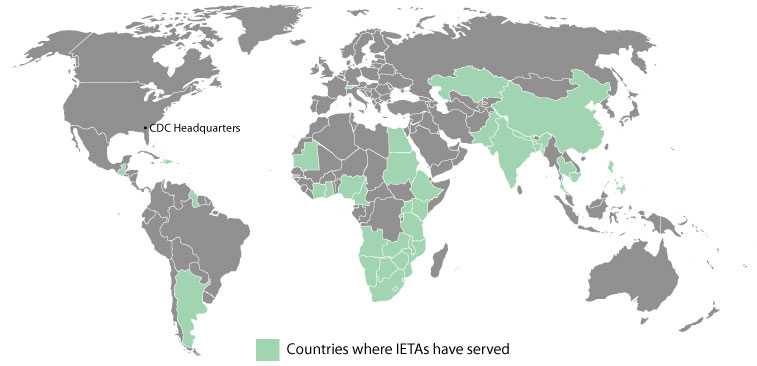IETA International Assignment
International assignments determined to be appropriate for the IETA program will include:
- A scope of work with a clear objective and specific tasks that will be performed;
- An in-country supervisor who will be able to evaluate the assignee's performance; and;
- Clear opportunities for the assignee to develop his/her professional expertise, demonstrate leadership skills, and make tangible contributions toward the success of the international program.
Potential duties in which an IETA participant might be placed:
- Program Management/Administration
- Program Delivery/Implementation
- Informatics
- Monitoring/Evaluation
- Health Education/Training
- Health Communication
- Epidemiology
- Surveillance
- Behavioral and Social Science
- Policy, Planning and Analysis
- Finance/Budget
- Training
- Laboratory
Since the IETA program began in 1998, more than 291 participants have served 12 programs in 34 countries.
Countries where IETAs have served: India, China, Cambodia, Bangladesh, Kazakhstan, Nepal, Pakistan, Philippines, Saipan, Thailand, Vietnam, Angola, Botswana, Cameroon, Cote d’Ivoire, Egypt, Ethiopia, Ghana, Kenya, Lesotho, Mauritania, Malawi, Mozambique, Namibia, Nigeria, Rwanda, Sudan, South Africa, Swaziland, Tanzania/Zanzibar, Uganda, Zambia, Zimbabwe, Dominican Republic, Trinidad & Tobago, Haiti, Switzerland, Guatemala, Guyana, Argentina
 Currently, Cohort 15’s twenty-three participants represent CDC, the National Institutes of Health (NIH), and the Food and Drug Administration (FDA). They are serving in Angola, Botswana, Kenya, Malawi, Mozambique, Namibia, South Africa, Tanzania, and Thailand, working with both the Division of Global HIV/AIDS (DGHA) and the Division of Tuberculosis Elimination (DTBE).
Currently, Cohort 15’s twenty-three participants represent CDC, the National Institutes of Health (NIH), and the Food and Drug Administration (FDA). They are serving in Angola, Botswana, Kenya, Malawi, Mozambique, Namibia, South Africa, Tanzania, and Thailand, working with both the Division of Global HIV/AIDS (DGHA) and the Division of Tuberculosis Elimination (DTBE).
The IETA program, in conjunction with hosting CDC programs and partner organization reserve the right to terminate an assignment if it is felt that the assignee is not fulfilling his/her duties, is not working well with the partners or is in any way damaging to the IETA program.
- Page last reviewed: December 22, 2014
- Page last updated: December 22, 2014
- Content source:
Global Health
Notice: Linking to a non-federal site does not constitute an endorsement by HHS, CDC or any of its employees of the sponsors or the information and products presented on the site.


 ShareCompartir
ShareCompartir